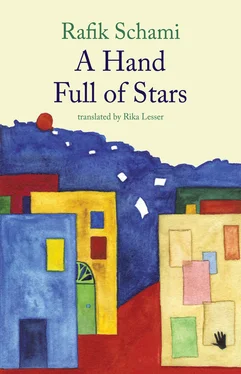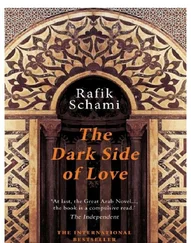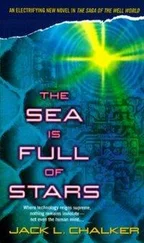Habib laughed and said, “First the iron will have to be imported!”
July 5 — A new language has been evolving on our street since it was widened. The old expressions, “Go play in the street,” “You can do that outside on the street,” and “You are not on the street, where you can play as you like,” are gone forever. The new street sayings are: “Look out for cars!” “Better play here in the apartment,” and “Anywhere but in the street; you could lose your skin there.”
Our mothers are having trouble adjusting. Sometimes one of them will say, irritably, “Go outside!” But then she’ll quickly correct herself and say, “I mean, settle down.”
Writing these lines has made me think of Robert. Our streets are slowly beginning to resemble those he described, but here we still don’t have as much to eat as they do in Europe.
July 10 — “Today it’s my treat. Are you in the mood to hear tall tales?”
No question about that! Of course I was in the mood, and together we set out. Uncle Salim knows half the town. Again and again he stopped to greet merchants and craftsmen. When we reached a certain coffeehouse, Uncle Salim was disappointed. The old storyteller had died, and no one had taken his place. He asked if there was anywhere else to go to hear someone tell tales. We learned there still are a few such cafes. The best-known one is near the Umayyad Mosque.
And so we strolled there. The cafe was rather full. Many tourists were waiting and drinking tea. We sat down near the high stool of the storyteller. Toward seven o’clock he arrived. He spoke quite loudly and always made lively gestures with his hands to accentuate danger or intensify battles. The tourists photographed him, and he grew louder and wilder. This pleased some members of the audience, and at the tops of their lungs they interjected their remarks. The storyteller recounted the fight between two clans, and after a while two men in the room were fighting, because each of them favored a different side. The customers sitting nearby calmed them down.
The storyteller recited in verse what the adversaries said to each other. Each praised himself to the skies and boundlessly reproached his enemy. At times it was funny. I laughed when one hero glorified not only his sword, his horse, and his own poetic talents, but even his mustache, saying, “My mustache is so strong, a falcon can perch on it.” A guest with an immense mustache glared at me angrily from a neighboring table and twirled his magnificent handlebars.
Just when the tale was most thrilling, the storyteller broke off. He asked those present to return to the coffeehouse the next day, when he would continue the saga of the hero, who was about to saw through the bars of his prison window.
Uncle Salim was visibly disappointed. “Like bread, storytellers are getting worse and worse,” he complained after a while. “He bellows and waves his hands about, but his voice does not stir the heart. A storyteller must speak softly; the softer he is, the wiser he is.”
I defended the storyteller, saying he had to bellow in order to be heard, but I didn’t convince Uncle Salim. “A bad storyteller laughs at his own joke before he has finished telling it.”
He’s right. Sometimes the man laughed out loud and said, “Here comes the funny part.” But what followed was more likely to be sad or sometimes dull.
July 11 — Uncle Salim is enthusiastic about the paper. He suspects his friend the old journalist is behind it. I have long contemplated telling him, but I will not say a word. This secret is mine alone.
July 12 — I have asked Nadia to ask her boss whether it is possible to take legal action against the editor Ahmad Malas because of the radio play. It was some time ago, but who knows?
July 14 — Nadia said her boss doesn’t believe that this play — which meanwhile has become very famous — came from the pen of a fifteen-year-old. Moreover, Malas has been the darling of every government and has become a powerful editor. “The testimony of fifty children isn’t worth a piece of crap.” (Nadia swore these were his exact words.) Malas can at any time prove that he and not Mahmud wrote and broadcast the play years ago. Is that what is commonly called justice?
July 16 — I have spoken with Habib. He knows Ahmad Malas. “All these characters live off the work of others. It would be interesting to write an article showing just how much many famous poets and musicians have stolen.” When he does this, he will also take up Mahmud’s case.
July 18 — Habib is a different person. He sings constantly and is very cheerful.
Lots of people continue to talk about the sock-newspaper, even though a month has gone by. I have the feeling many people are making copies and passing it along. They say it has turned up in Aleppo and in Homs. I have learned from Nadia that the secret service is really spinning its wheels.
During lunch break I have begun to learn how to type. My boss is griping about it a little. He fears for his typewriter. Sometimes I can’t find a letter at all; it’s as if it were hiding from my blows.
July 22 — Nadia came to Habib’s apartment for an hour today. She’ll soon be sixteen and no longer a child. In the last months she has grown quickly. We love each other very much, and we often talk about the future. Today I nearly put my foot in my mouth. When I was discussing our prospective children, I said, “. who hopefully will have no need of a sock-newspaper.” Nadia looked at me wide-eyed, and I tried to play this down by making a joke of it. “I mean,” I retorted, “the state newspaper, which stinks like sweaty socks.”
Nadia shook her head. “Your jokes are getting sillier and sillier,” she said, and buttoned up her blouse.
July 24 — Not long ago I wrote two poems. The first was about the women poets praise until they marry; once they marry, they forget their songs and torment their wives. The second was about the sea, which exerts itself, leaping up to wash away the clouds from the face of the sky because it misses the blue color.
August 1 — Habib is nearly finished with his translation. Today he got an advance and made dinner at his place for Mahmud and me. (Mariam looked in briefly.) I bragged that I could type two pages an hour. In reality all I can do is one, and that one with lots of errors.
In the bookshop, my boss let me type a few letters. Today I typed “Dear Mr. Hound” instead of “Dear Mr. Pound.” Thank God my boss checked the letter. Then he said, “If I want to put Mr. Pound off, all I have to do is tell you to write him a letter. For then he will be Dearest Hound, and the book he ordered wasn’t on swans but swines, and our Kindest wishes will become our Blindest fishes.”
August 3 — The second issue is ready! I have typed quite a lot. Habib wrote about corruption. He condoned the bribe-taking of petty officials who need the money to feed their children, but attacked the venality of the ministers who are bleeding the country.
I also wrote about the poor students who, at too young an age, have to leave school and go to work.
Again Mahmud thought up really great questions. The first one was: “Have you already read the first issue of the sock-newspaper?”
We urged all people fortunate enough to have learned to read and write to make their own newspapers. Habib came up with a lovely sentence: “Communication is the responsibility of every human being; don’t leave it to the government!”
Sunday — We have run off six hundred copies. On Friday Mahmud and I carried the socks to the marketplace; again they sold in a flash. Then we walked through the bazaar and looked at the stands. We saw a man with a dancing bear — a piteous animal, emaciated and sad, its body covered with scars. It hobbled around, and Mahmud said he was sure the bear was crying and that bears, like people, understand everything. How humiliating this dance would be if the bear really has feelings as we do.
Читать дальше












